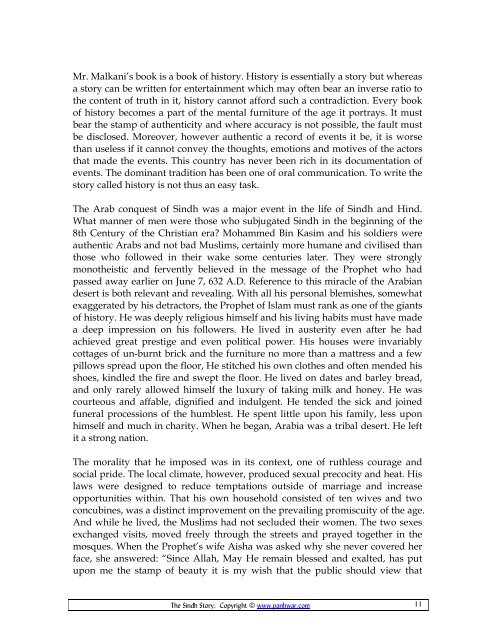Create successful ePaper yourself
Turn your PDF publications into a flip-book with our unique Google optimized e-Paper software.
Mr. Malkani’s book is a book of history. History is essentially a story but whereas<br />
a story can be written for entertainment which may often bear an inverse ratio to<br />
the content of truth in it, history cannot afford such a contradiction. Every book<br />
of history becomes a part of the mental furniture of the age it portrays. It must<br />
bear the stamp of authenticity and where accuracy is not possible, the fault must<br />
be disclosed. Moreover, however authentic a record of events it be, it is worse<br />
than useless if it cannot convey the thoughts, emotions and motives of the actors<br />
that made the events. This country has never been rich in its documentation of<br />
events. The dominant tradition has been one of oral communication. To write the<br />
story called history is not thus an easy task.<br />
The Arab conquest of Sindh was a major event in the life of Sindh and Hind.<br />
What manner of men were those who subjugated Sindh in the beginning of the<br />
8th Century of the Christian era? Mohammed Bin Kasim and his soldiers were<br />
authentic Arabs and not bad Muslims, certainly more humane and civilised than<br />
those who followed in their wake some centuries later. They were strongly<br />
monotheistic and fervently believed in the message of the Prophet who had<br />
passed away earlier on June 7, 632 A.D. Reference to this miracle of the Arabian<br />
desert is both relevant and revealing. With all his personal blemishes, somewhat<br />
exaggerated by his detractors, the Prophet of Islam must rank as one of the giants<br />
of history. He was deeply religious himself and his living habits must have made<br />
a deep impression on his followers. He lived in austerity even after he had<br />
achieved great prestige and even political power. His houses were invariably<br />
cottages of un-burnt brick and the furniture no more than a mattress and a few<br />
pillows spread upon the floor, He stitched his own clothes and often mended his<br />
shoes, kindled the fire and swept the floor. He lived on dates and barley bread,<br />
and only rarely allowed himself the luxury of taking milk and honey. He was<br />
courteous and affable, dignified and indulgent. He tended the sick and joined<br />
funeral processions of the humblest. He spent little upon his family, less upon<br />
himself and much in charity. When he began, Arabia was a tribal desert. He left<br />
it a strong nation.<br />
The morality that he imposed was in its context, one of ruthless courage and<br />
social pride. The local climate, however, produced sexual precocity and heat. His<br />
laws were designed to reduce temptations outside of marriage and increase<br />
opportunities within. That his own household consisted of ten wives and two<br />
concubines, was a distinct improvement on the prevailing promiscuity of the age.<br />
And while he lived, the Muslims had not secluded their women. The two sexes<br />
exchanged visits, moved freely through the streets and prayed together in the<br />
mosques. When the Prophet’s wife Aisha was asked why she never covered her<br />
face, she answered: “Since Allah, May He remain blessed and exalted, has put<br />
upon me the stamp of beauty it is my wish that the public should view that<br />
The Sindh Story; Copyright © www.panhwar.com<br />
11


